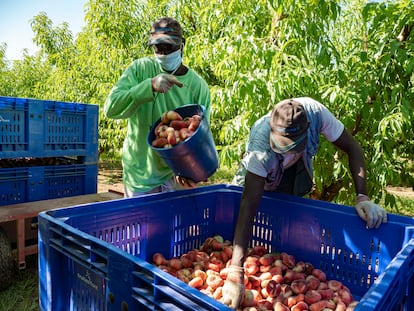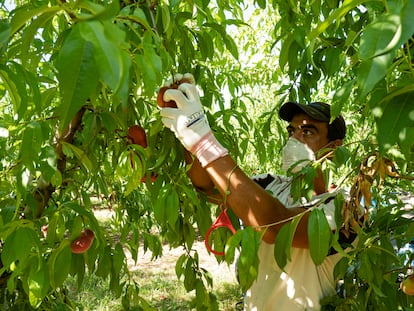Catalan growers torn between fear of Covid-19 and the need to bring in the harvest
Parts of Lleida province are preparing to receive seasonal workers, but there are concerns their arrival could lead to new coronavirus outbreaks


“We only earn money once a year,” says Josep Maria Salvador, a grower from the small town of Castellnou de Seana, in Lleida province in Catalonia. “See these apples? I’ll start picking them on August 4. Right now, all my money is in these trees. If I catch the coronavirus, the apples will rot right here and I’ll not only be sick, I’ll also be ruined.”
Salvador keeps more than three meters away from both strangers and acquaintances at all times, and has been keeping social contact to the absolute minimum for weeks. He wants to protect himself as much as he can from catching Covid-19, which has so far been held at bay in his small village, even though it has spread in the city of Lleida, just 35 kilometers away. The comarca of Pla d’Urgell – an administrative district comprising 16 municipalities and 36,600 inhabitants – is dependent on livestock and agriculture.
A few weeks ago, there was a spike in the number of infections in Pla d’Urgell and the Segrià comarca, where 2,555 coronavirus cases have since been reported. The figure represents 64% of all cases recorded in the area during the pandemic, and there are at least a dozen fruit and vegetable companies with infected workers. Hospitalizations in Lleida also doubled in the last two weeks, and on Sunday there were 142 admissions, with 19 in intensive care. The resurgence of cases and new lockdown measures have delivered a blow to the economy, already hit hard by the pandemic.
If things take a turn for the worse, we can put people in the youth hostel while we wait for the testsJordi Llanes, mayor of Castellnou de Seana
The recent outbreaks are being partly blamed on nightlife activities and on the public’s increasingly complacent attitude towards coronavirus safety measures. But a lot of the blame has also been placed on the presence of hundreds of seasonal workers who have been harvesting stone fruit such as peaches, nectarines and paraguayo peaches in the Segrià comarca for weeks. These are young people who are employed on a piecework basis and who keep any Covid-19 symptoms hidden for fear of losing a day’s work. Moreover, they live in overcrowded hostels and apartments, and at times in cars or on the street in order to send the money to their families back in Senegal, Gambia or Mali.
The stone fruit season is about to give way to the pear and apple harvest in regions like Pla d’Urgell and l’Urgell. The municipalities have taken note of what has happened in Segrià, where the virus spread to nearby areas such as La Noguera. Now, Pla d’Urgell is starting to see the first arrivals of seasonal workers since the pandemic began, and they know they can’t afford to make any mistakes.
Pere Roqué is the president of the Lleida Young Growers Agricultural Association. Along with others in his field, he has drawn up guidelines and passed them to the mayor of Castellnou de Seana and other municipalities in the Pla d’Urgell area. “This year, I have named it the season of the mask,” he says. “The problem is that the farmer can only guarantee the safety of the seasonal workers while they are at work. What they do outside of that is their own business, though it can affect us all.”
There are 700 people living in Castellnou de Seana, a village that belongs to what has been dubbed “deserted Catalonia.” Yet, in just a few weeks, 50 seasonal workers will settle here. The mayor, Jordi Llanes of the Catalan European Democratic Party (PdCAT), has been in meetings for weeks now, considering how to protect both residents and seasonal workers from the epidemic. “I have spoken to the government delegation in Lleida and, in the end, I think the only people who can do anything to protect us is ourselves,” he says. “We had to find a place to isolate seasonal workers with symptoms until they get tested. Above the school, there are two floors available from back when we had to house the teachers. They are almost ready.”

In Castellnou, only two people caught the virus during the state of alarm and there was no chain of infection. “We spent 60 days washing down the whole village with water and bleach, including building façades,” says Llanes. “We totally massacred the plants.”
The mayor gets out his phone and calls his aide Joan Vendrell, “Hey, come here and open up the teachers’ apartment.” Vendrell is there in a couple of minutes. A middle-aged man who manages to crack jokes while preserving a permanently angry expression, he helps the mayor make the beds in the teachers’ apartment and together they reminisce about all the jobs they’ve done together since 2007, when Llanes became mayor. “We’ve done everything, from going to homes to see if someone has died to disinfecting the village,” says Llanes. “Neither [Barcelona mayor Aida] Colau nor Miquel Pueyo [the mayor of Lleida] has done that.”
When masks were in scarce supply, one local informed the mayor that he had thousands that could be used. “We bought them all from him and sold them at cost price,” says Llanes. “We couldn’t afford to give them away, but we could help protect everyone. We sold 100 gloves for €6 and 10 masks for €1.”
Taking no chances
If a seasonal worker shows symptoms, the idea is to confine that person in the teachers’ quarters, which can hold up to eight people. But the mayor also has a Plan B up his sleeve. “If things take a turn for the worse, we can put people in the youth hostel while we wait for the tests,” he says. Llanes phones Vendrell again, and the latter reappears and opens the door to a room filled with bunk beds and a shower.
The modest hostel is right next to several dust tracks and a gas station that has been shut for years. “The Camino de Santiago [Way of Saint James] comes through here and when the pilgrims come, they call us on the phone and we have to open up the hostel for them whether it’s a Saturday, a Sunday or a Wednesday,” says Vendrell, though this year the coronavirus has meant fewer pilgrims.
Trini Oliver, a clerical worker at the village council, has placed hand sanitizer at the entrance and makes sure that all documents remain untouched in a tray for at least 24 hours before being handled. “The council has never been closed,” she says. “When we haven’t been able to deal with the public in person, we have done so by telephone or WhatsApp.”
Oliver is meticulously careful about the job in hand. The few growers who have already employed seasonal workers are required to take their temperature twice a day and send her the results, which are then sent to the governing body of the comarca. There are also reams of recommendations handed out to the seasonal workers in Catalan, Spanish, Romanian and Arabic.
Meanwhile, as Josep Maria Salvador stands looking out over one of his fields right in front of the mayor’s restaurant, he turns to the mayor and says, “Jordi, if we get hail, the insurance will cover my losses, but if I catch the coronavirus, I’ll be ruined.” To which the mayor replies, “I’ve told you a thousand times that if you get sick, I’ll pick your apples for you.”
English version by Heather Galloway.
Tu suscripción se está usando en otro dispositivo
¿Quieres añadir otro usuario a tu suscripción?
Si continúas leyendo en este dispositivo, no se podrá leer en el otro.
FlechaTu suscripción se está usando en otro dispositivo y solo puedes acceder a EL PAÍS desde un dispositivo a la vez.
Si quieres compartir tu cuenta, cambia tu suscripción a la modalidad Premium, así podrás añadir otro usuario. Cada uno accederá con su propia cuenta de email, lo que os permitirá personalizar vuestra experiencia en EL PAÍS.
¿Tienes una suscripción de empresa? Accede aquí para contratar más cuentas.
En el caso de no saber quién está usando tu cuenta, te recomendamos cambiar tu contraseña aquí.
Si decides continuar compartiendo tu cuenta, este mensaje se mostrará en tu dispositivo y en el de la otra persona que está usando tu cuenta de forma indefinida, afectando a tu experiencia de lectura. Puedes consultar aquí los términos y condiciones de la suscripción digital.








































